Reviews
J. Lee Thompson
Mexico / USA / UK, 1984
Credits
Review by Glenn Heath Jr.
Posted on 07 November 2011
Source Henstooth Video DVD
Categories BRONSON!
The rough and tumble acting career of Charles Bronson is littered with blue-collar killers and avenging angels, virtually silent men who favor eyebrow-raising action over stylized dialogue. These cold-blooded ciphers view long speeches and moral justifications as signs of weakness, communicating instead via pummeling shotgun blasts and swift knife thrusts. It’s a special kind of language perfected to combat the crippling societal indifference and blatant governmental failure of cold-war “democracies”, leveling the moral playing field between the unjust and the underrepresented. In fact, class division and cultural repression always plague the fearful souls residing on the fringes of a Bronson action film, but their screams for justice are answered with every muzzle flash of his locked and loaded pistol.
Directed by the great B-movie filmmaker J. Lee Thompson and released in 1984, The Evil That Men Do is a shockingly frank and polarizing example of the Bronson archetype pressed into action by egregious and unnecessary evil. First comes a striking South American-set prologue in a dank military compound introducing the maniacal talents of a torturer called The Doctor, a hooded monster who leapfrogs from one dictatorship to the next providing his special services to the highest bidder. As The Doctor lectures a group of government conscripts on the virtues of sadism, explaining how torture “has become a subtle and sophisticated specialty,” his monotone voice is juxtaposed with the bloody corpses of his victims slumped on gurneys in the hallway. Here, Thompson favors the background horrors, the deformation of humanity noticeable in all corners of the frame. A few strategically placed electrodes on one particularly unlucky journalist and a series of howling screams later, it’s clear The Doctor is evil incarnate, someone who needs killing immediately.
Cut to a pristine beach in the Cayman Islands where Bronson’s pajama wearing hit man, Holland, is enjoying a well-earned retirement. He even has ample time to say “good morning” to his gigantic fish Quasimodo, a strange tangential moment attempting to humanize his character. When news of a friend’s murder at the hands of The Doctor reaches his shore, Holland hesitates for just enough time so he can be properly swayed by videotaped confessions of The Doctor’s victims solemnly recounting the terrible atrocities they’ve experienced. “The Doctor stands outside the laws of normal civilized people,” one man says, and this scene confirms The Evil That Men Do as a raging political film and not just another revenge flick. Even though Holland’s quest for retribution starts as a personal act, it takes on a national importance almost immediately when the pervasiveness of The Doctor’s crimes becomes more apparent. A few cuts later Holland’s feet are on the ground in South America with the aforementioned journalist’s wife and daughter, posing as a family man to dispatch his prey for good. Ultimately, Holland becomes an unknowing enabler of the powerless masses waging a losing battle against corrupt American foreign policies and the omniscient devils they produce.
Set almost entirely in Guatemala City during the aftermath of a coup d’état, The Evil That Men Do immerses the viewer in a tense military state where at any one moment one can be questioned and shot for non-compliance. Holland cuts through this bloody landscape like a shark, never phased by the sudden outbursts of violence that erupt at the airport or on the street. As Holland sets up shop waiting for his moment to pounce, Thompson cuts back to The Doctor living with his sister Claire at a fortified compound, the duo protected by three lethal bodyguards of varying ethnicities. Under pressure from a South American conference on human rights, the Guatemalan government abruptly asks The Doctor and his crew to clear out, adding another dimension to the film’s deceptively simple narrative. When Claire learns of this betrayal, she screams at one mid-level official, “Hypocrites! Every government represented condemns my brother publicly and welcomes him privately.” Later in that same scene, The Doctor solidifies his manifesto for maximum effect: “Human rights violations? There is no such thing. There is only the security of the state and who show would undermine that security.”
Even more interesting is how Thompson frames The Doctor and Claire’s solution to their geographical bind by visiting a corrupt American diplomat, who has secretly utilized their services in the past. It’s no longer inferred that The Doctor and the American government are linked; it’s a dead certainty, and Holland’s vengeance almost becomes background fodder in the face of such a damning critique. Fascinating tangents reveal themselves, like how certain villains live alternative lifestyles (Claire is lesbian, a bodyguard likes to swing), which Holland ends up manipulating to his advantage. Often, these kinds of character details are far more worthy of attention than any of the film’s wooden action scenes. Thompson eventually gets down to the business at hand, and The Evil That Men Do rolls out a bloody red carpet for every sinner Holland comes across. Yet, the lack of difficulty or true conflict in such set pieces diminishes the film slightly, as Holland’s god-like skill-set exists above all other things. A slow motion knife-throwing shot cements this theory in stone.
Despite the presence of some truly pedestrian chase sequences and uninteresting gunfights, The Evil That Men Do ends in stunning fashion, confirming its hero’s identity as a revolutionary proxy for the powerless collective. Lured by Holland into an abandoned mine shaft so he can retrieve his kidnapped sister, The Doctor comes face to face with the very victims he once took so much joy in torturing. As a group of maimed miners rip apart their tormentor’s limousine with pick axes and shovels, the justification of their actions is a probing statement on the necessity of violence, something only a Bronson narrative could convincingly convey. The Evil That Men Do ends just as quickly as it began, with Holland returning home to his island paradise a true-blue family man. Thompson never clarifies whether or not Holland understands the political and social ramifications of his journey. But this isn’t surprising, though, because like so many other Bronson badasses, Holland is a man defined by unspoken valor. The action itself is always enough.
More BRONSON!
-
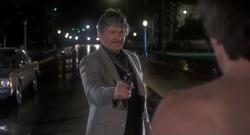
10 to Midnight
1983 -
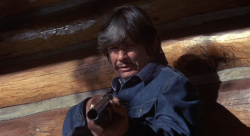
Mr. Majestyk
1974 -
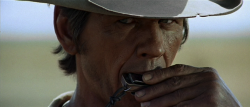
Once Upon a Time in the West
1968 -
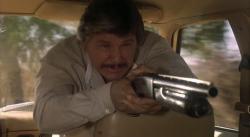
The Evil That Men Do
1984 -
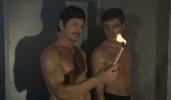
Farewell, Friend
1968 -
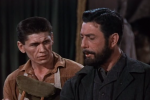
House of Wax
1953
We don’t do comments anymore, but you may contact us here or find us on Twitter or Facebook.



